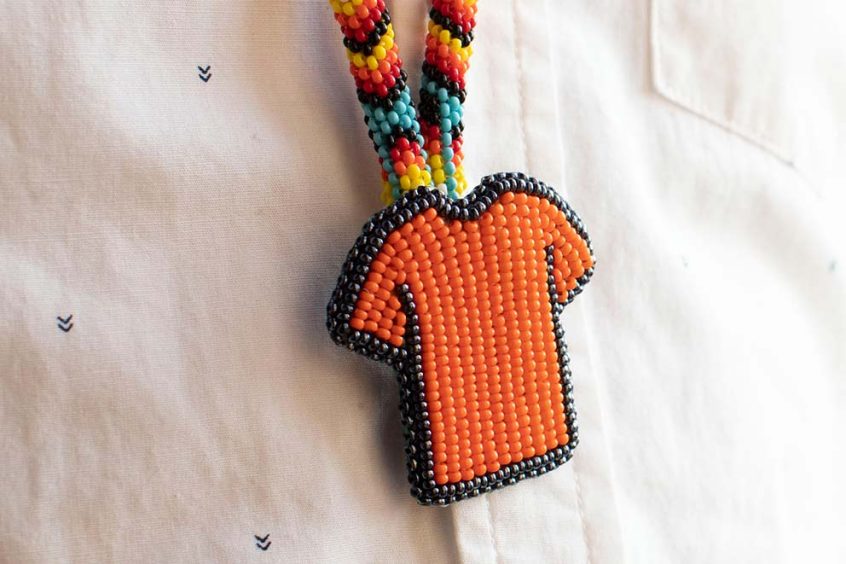Tomorrow (September 30) is National Day for Truth and Reconciliation and Orange Shirt Day. It’s a day to honour the children who never returned home and Survivors of residential schools, as well as their families and communities.
It’s also a day to raise awareness of the generational impacts of residential schools and to promote the concept of “Every Child Matters”.
At East Toronto Health Partners (ETHP), the Ontario Health Team (OHT) serving East Toronto, we recognize the role we play in ensuring a safe, healing and welcoming space for First Nations, Inuit and Métis community members. This includes providing culturally competent, trauma-informed care and recognizing the value of Aboriginal healing practices.
We thank our member organizations for their ongoing commitment to this work and taking the time to mark this important occasion.
Here are some of the ways they recognized National Day for Truth and Reconciliation and Orange Shirt Day this year.
Access Alliance Multicultural Health and Community Services
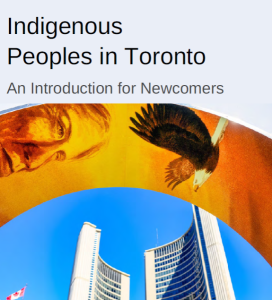
This summer, Access Alliance participated in the launch of “Indigenous Peoples in Toronto: An Introduction for Newcomers,” a resource introducing Toronto newcomers to First Nations, Inuit and Métis history, cultures and perspectives.
The resource was created in partnership with the City of Toronto, the Ontario Council of Agencies Serving Immigrants (OCASI) and Access Alliance. Funding for this resource was provided by Immigration, Refugees and Citizenship Canada. The project was led and informed by newcomer and Indigenous expertise, including the Indigenous Newcomer Advisory Circle. We are thankful for their guidance and collaboration.
The guide aligns with the Truth and Reconciliation Commission’s Call to Action #93 – Newcomers to Canada, and introduces newcomers to the cultures, histories and current realities of Indigenous peoples. It offers newcomers to Toronto a better understanding of the land on which they are settling and the Indigenous communities that were here for thousands of years before colonization.
The purpose of the guide is twofold:
- It is intended to build meaningful relationships between newcomers and Indigenous peoples by encouraging learning and sharing stories of diversity, resilience and strength.
- The accompanying facilitator’s guide was created for settlement workers, ESL instructors and others who work with and for newcomers, acting as a helpful resource to support this learning.
The launch was celebrated at David Pecaut Square with remarks from Indigenous Elders, City staff and leaders from the newcomer and refugee service sector.
Access Alliance is committed to supporting newcomer clients to deepen the understanding of their communities and the history and diversity of their adopted country. We are thankful to our partners at the City of Toronto and OCASI, as well as all the Indigenous and newcomer community organizations whose time and expertise contributed greatly to the development of this vital resource.
The guide is available on the City’s After You Arrive webpage. It aligns with the strategic pillar, Supporting Civic Engagement and Community Capacity of Newcomers, in the Toronto Newcomer Strategy.
East End Community Health Centre
East End Community Health Centre organized an all-staff meeting this month that included a series of events related to Truth and Reconciliation.
In addition, the centre’s staff participated in an Ontario Health training session called Cultural Competence in Healthcare, which stressed the importance for frontline healthcare professionals to understand and apply First Nations, Inuit, Métis and urban Indigenous cultural sensitivity and safety to provide effective care.
Staff were also encouraged to wear an orange shirt to work on September 29. In October, the team will discuss their learnings from the training session and how they may most effectively apply these lessons in their practices.
Home and Community Care Support Services
Home and Community Care Support Services (HCCSS) is committed to a culture of equity, inclusion, diversity and anti-racism. In Toronto, and across the province, HCCSS staff were encouraged to participate in special events organized by a staff-led provincial Indigenous Working Group.
These events included participating in a talk from the National Centre for Truth and Reconciliation, where a guest speaker spoke about intergenerational trauma and its impacts on communities and the importance of a trauma-informed approach across the board for health care providers.
In addition, HCCSS welcomed Indigenous Navigator, Kathy MacLeod-Beaver, from the Central East Regional Cancer Program to share key learnings and actions for staff to take away and use in their own practice with Indigenous communities.
HCCSS is also committed to bringing awareness to Indigenous history and culture and to providing resources to better support the Indigenous communities they serve. Throughout September, members of the Indigenous Working Group shared information to help staff to learn more about Indigenous culture or the issues that continue to face Indigenous communities today, including the four sacred medicines, the Qikiqtani Truth Commission or how to be an effective ally.
HCCSS recognizes the rich history, heritage, resilience and diversity of First Nations, Inuit and Métis peoples across Canada.
ProResp
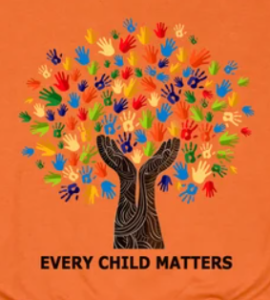 ProResp embraces the differences of the peoples who live in Canada, including their teams and patients. They humbly serve with equality and dignity, and recognize that our nation’s history is not all positive but that we must learn from our past.
ProResp embraces the differences of the peoples who live in Canada, including their teams and patients. They humbly serve with equality and dignity, and recognize that our nation’s history is not all positive but that we must learn from our past.
Since the National Day for Truth and Reconciliation was officially established, ProResp has taken time to encourage reflection on the tragic history of residential schools.
Each year, ProResp shares videos, presentations and other communications with staff that recognize this important day. They also remind staff to wear orange to share the message that every child matters.
South Riverdale Community Healthy Centre
South Riverdale Community Health Centre (SRCHC) hosted a screening of the documentary, Northern Feathers: Love, Culture, Harm Reduction, at the Redwood Theatre this month. Following the screening, attendees had the chance to listen to speakers, including Elder Wanda Whitebird.
Northern Feathers is a joint creation between SRCHC and Sheltered Perspective Films. The film was directed by Jason S. Cipparrone; executively produced by Les Harper, Indigenous Health Promoter at SRCHC; and features Elder Wanda Whitebird.
In spring 2022, SRCHC created a program that was the first of its kind to bring together Indigenous women who use drugs and to provide a space for their inclusion in cultural activities from a harm reduction framework.
Northern Feathers follows this group of women on their transformative journey to create their own regalia and dance in a cultural event. Participants and project staff share their deeply personal experiences of cultural reclamation and Indigenous community-building from a harm reduction perspective.
The program’s philosophy was articulated by Elder Wanda Whitebird, who provided guidance to the project: “Harm reduction is not about drugs … it’s about unconditional love and about being there on your own terms.” Watch the documentary trailer here.
S.R.T MedStaff
S.R.T. MedStaff promoted awareness throughout its organization by sharing information about the history behind National Day for Truth and Reconciliation. They also encouraged staff to wear orange in recognition of Orange Shirt Day.
Every day, S.R.T. MedStaff also encourages its team to be considerate in the interactions they have with Indigenous colleagues, clients and partners.
Unity Health Toronto
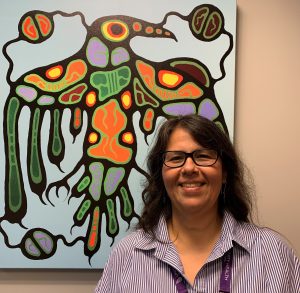
Roberta Pike, the inaugural Director of Indigenous Wellness, Reconciliation and Partnerships at Unity Health Toronto.
Unity Health Toronto is committed to advancing Indigenous health and reconciliation across its network. To mark this year’s National Day for Truth and Reconciliation, Unity Health President and CEO, Dr. Tim Rutledge, issued a letter to the community, providing an update on the organization’s commitments from last year and what the organization plans to accomplish in the year ahead.
Unity Health’s efforts to improve the experiences that Indigenous peoples have within their organization are led by the Indigenous community; the First Nations, Inuit and Métis Community Advisory Panel at Unity Health; and several Indigenous leaders and staff, including Roberta Pike, who joined the organization on July 31 as the inaugural Director of Indigenous Wellness, Reconciliation and Partnerships.
Other activities for this year’s National Day for Truth and Reconciliation included staff meet and greets with Roberta; an intranet resource for Roberta’s new Office of Indigenous Wellness, Reconciliation and Partnerships; and orange Unity Health pins handed out to staff, alongside information on how staff can work to advance reconciliation in their own lives.
The organization will also be amplifying stories and articles featuring Indigenous staff and research, including this Behind the Mask profile on Jennefer Simo and additional profiles on staff recruited into the Indigenous Office as they’re hired.
VHA Home HealthCare
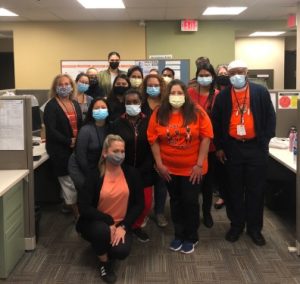
VHA Home HealthCare Staff wearing orange shirts.
This month, VHA Home HealthCare held a series of workshops for team members following Reconciliation Canada’s Kitchen Table Dialogue model. A Kitchen Table Dialogue creates space for constructive conversations on reconciliation.
These workshops offered an opportunity to foster understanding, healing, and connection while addressing the historical and ongoing injustices faced by Indigenous peoples.
The framework allows Indigenous peoples and all Canadians the opportunity to join the dialogue on reconciliation and contribute to the movement, helping us to create a new way forward for all people in Canada.
West Scarborough Neighbourhood Community Centre
West Scarborough Neighbourhood Community Centre implemented an Organizational Development Day for staff and volunteers. The day included an interactive presentation called “The Path: Terminology and Origin Stories” by Lisa Shawongonabe Abel. Lisa’s education is rooted in her Anishinaabe culture and she has worked for over 25 years within the Indigenous community.
The presentation began with an introduction to the First Nations, Inuit and Métis, including who they are, and where and how they lived on this land we now call Canada. The goal is to demystify the use of such terms as “Indian,” “Native,” “Aboriginal,” “Indigenous”, “First Nation,” “Inuit” and “Métis”, and review and debunk several stereotypes and myths propagated in media and popular culture regarding Indigenous peoples.
The presentation introduced people to several First Nations and Inuit creation and origin stories. It also aimed to teach people about current theories regarding the migrations of paleo-Indigenous peoples to the Americas and offered an overview of different Indigenous nations that populated Canada prior to European contact.
In addition, West Scarborough Neighbourhood Community Centre’s Boys and Girls Club (BGC) programs conducted training and education sessions throughout the month.
Recreational staff leaders received in-person training regarding the significance of Truth and Reconciliation. They also received educational supplementary resources available from the Orange Shirt Day toolkit provided by BGC Canada.
Using their training and knowledge, staff will be able to curate an educational program and facilitate various activities that embrace Indigenous Ways of Knowing, which focuses on respect, relevance, reciprocity, and responsibility for the participants of our programs.
Children and youth at BGC West Scarborough also explored prominent Indigenous figures in Canada and learned about the ways their accomplishments have not only shaped the history of Canada but also how Indigenous communities continue to fight to regain the power and identity stolen from them as a result of Canada’s colonial history.

